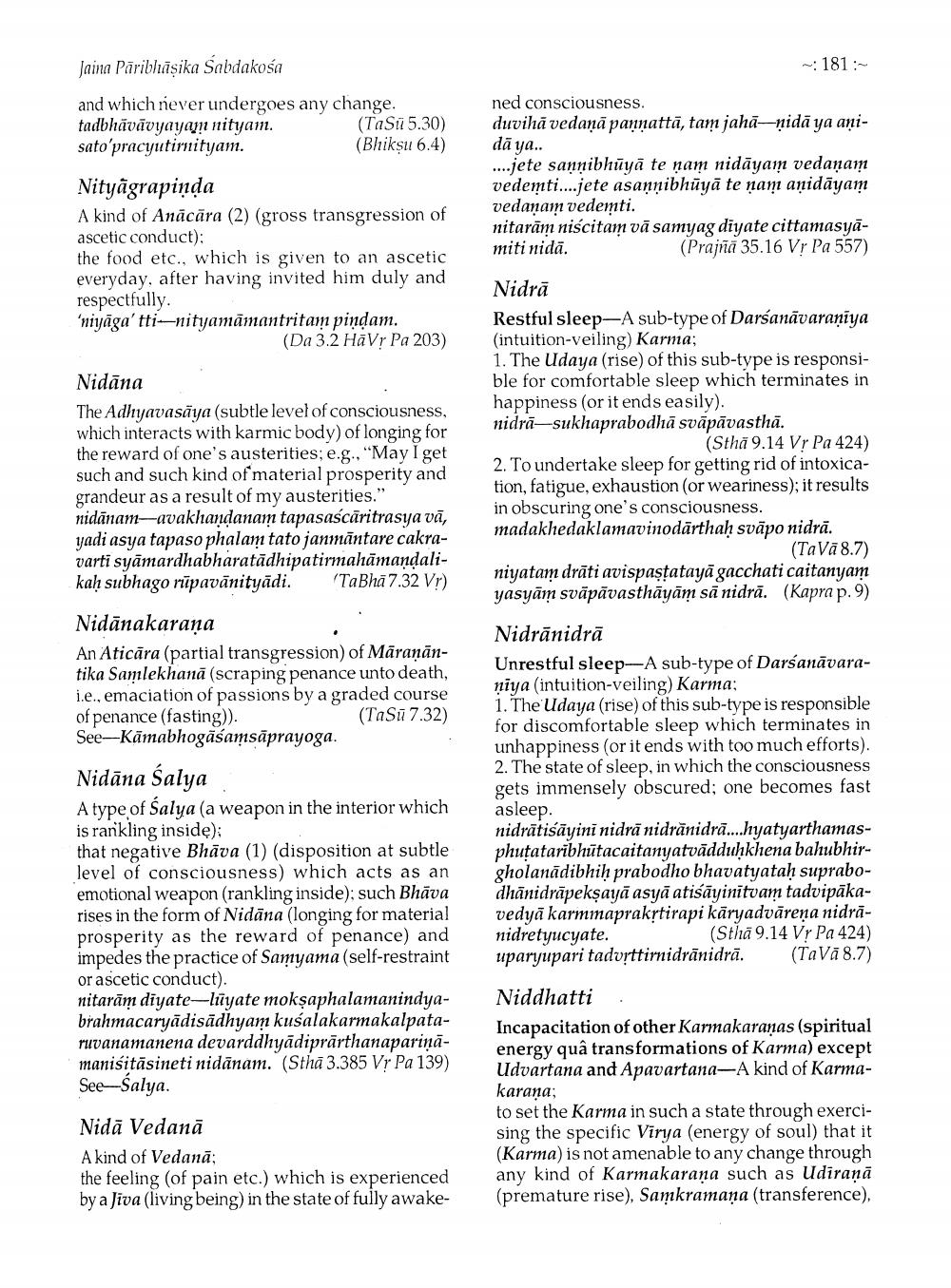________________
~181:
Jaina Pāribhāsika Sabdakosa and which never undergoes any change. tadbhāvāvyayan nityam.
(TaSu5.30) sato'pracyutirnityam.
(Bhiksu 6.4)
ned consciousness. duvihā vedaņā pannattā, tam jahā—ņidā ya anida ya.. ....jete sannibhūyā te nam nidāyam vedanam vedemti....jete asannibhūyā te nam anidāyam vedanam vedemti. nitarām niścitam vā samyag diyate cittamasyamiti nidā.
(Prajna 35.16 Vy Pa 557)
Nityāgrapinda A kind of Anācāra (2) (gross transgression of ascetic conduct): the food etc., which is given to an ascetic everyday, after having invited him duly and respectfully. 'niyāga'tti-nityamamantritam pindam.
(Da 3.2 HāVr Pa 203)
Nidāna The Adhyavasāya (subtle level of consciousness, which interacts with karmic body) of longing for the reward of one's austerities; e.g., "May I get such and such kind of material prosperity and grandeur as a result of my austerities." nidānam-avakhandanam tapasascāritrasya vā, yadi asya tapaso phalam tato janmāntare cakravarti syāmardhabharatadhipatirmahāmandalikah subhago rūpavānityādi. Tabhä 7.32 Vr)
Nidrā Restful sleep-A sub-type of Darsanāvaraniya (intuition-veiling) Karma; 1. The Udaya (rise) of this sub-type is responsible for comfortable sleep which terminates in happiness (or it ends easily). nidrā—sukhaprabodhā svāpāvasthā.
(Sthā 9.14 Vr Pa 424) 2. To undertake sleep for getting rid of intoxication, fatigue, exhaustion (or weariness); it results in obscuring one's consciousness. madakhedaklamavinodārthaḥ svāpo nidrā.
(Tavā 8.7) niyatam drāti avispastatayā gacchati caitanyam yasyām svāpāvasthāyām sānidrā. (Kapra p. 9)
Nidānakarana An Aticāra (partial transgression) of Maranāntika Samlekhanā (scraping penance unto death, i.e., emaciation of passions by a graded course of penance (fasting)).
(TaSū7.32) See-Kāmabhogāśamsāprayoga.
Nidāna Salya A type of Salya (a weapon in the interior which is rankling inside): that negative Bhāva (1) (disposition at subtle level of consciousness) which acts as an emotional weapon (rankling inside): such Bhäva rises in the form of Nidāna (longing for material prosperity as the reward of penance) and impedes the practice of Samyama (self-restraint or ascetic conduct). nitarām diyate-luyate mokşaphalamanindyabrahmacaryādisādhyam kusalakarmakalpataruvanamanena devarddhyādiprarthanapariņāmanisitāsineti nidānam. (Sthā 3.385 Vr Pa 139) See-Salya.
Nidrānidrā Unrestful sleep-A sub-type of Darsanāvaraniya (intuition-veiling) Karma: 1. The Udaya (rise) of this sub-type is responsible for discomfortable sleep which terminates in unhappiness (or it ends with too much efforts). 2. The state of sleep, in which the consciousness gets immensely obscured; one becomes fast asleep. nidrātisāyini nidrā nidrānidrā....hyatyarthamasphutataribhūtacaitanyatvādduhkhena bahubhirgholanādibhih prabodho bhavatyataḥ suprabodhānidrāpekṣayā asyā atisāyinitvam tadvipäkavedyā karmmaprakrtirapi kāryadvāreņa nidrānidretyucyate.
(Stha 9.14 Vr Pa 424) uparyupari tadvrttirnidrānidrā. (TaVā8.7)
Niddhatti Incapacitation of other Karmakaranas (spiritual energy quâ transformations of Karma) except Udvartana and Apavartana-A kind of Karmakarana; to set the Karma in such a state through exercising the specific Virya (energy of soul) that it (Karma) is not amenable to any change through any kind of Karmakarana such as Udiraņā (premature rise), Samkramana (transference),
Nidā Vedanā A kind of Vedanā; the feeling (of pain etc.) which is experienced by a Jiva (living being) in the state of fully awake




